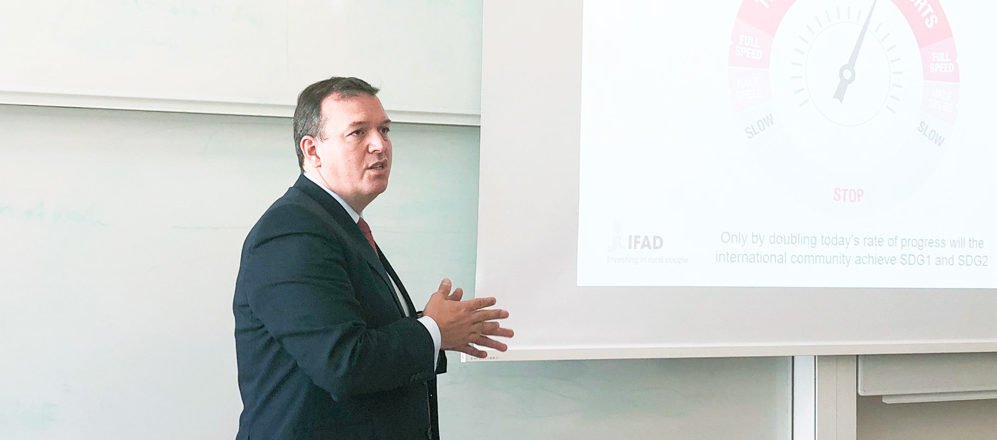“We have to power up our efforts if we are to achieve the 2030 Agenda! Rural development needs social inclusion!”, urged Lisandro Martin, IFAD during his meeting with young researchers in SLU, Uppsala. To do this, he argued, it is essential to focus on rural transformation.
75% of the chronically hungry and malnourished people in the world live in the rural areas of low-income countries. Most of them depend on agriculture for their livelihoods. This means that climate change, volatile food prices and a growing global population are challenges that could push millions of already vulnerable people into poverty and food insecurity.
The International Fund for Agricultural Development (IFAD) is a specialized UN Agency and an international financial institution. It was set up to mobilize and channel investments to low-income countries with agrarian economies. IFADs mission is to invest in rural people, empowering them to increase food security, improve the nutrition of their families and increase their incomes.
Lisandro Martin is the Director West and Central Africa Division and the Acting Director of the Operational Policy and Results Division (OPR) at IFAD. At the Young Researchers Meeting in Uppsala, a two-day conference organized by SLU-Global and SIANI, he held an open seminar about the challenges of rural development and IFADs approach in assisting smallholder farmers.
All of the IFADs efforts are specifically targeting the UN Sustainable Development Goals (SDGs) 1 and 2 – No Poverty and Zero Hunger. According to Lisandro Martin to achieve the goals on time we need to double our efforts and invest more in rural people. “For us at IFAD, the next three years ahead are really important since the projects that are implemented during this phase will be our contribution to the Global Development Agenda”, explained Mr. Martin.
The pillars of rural transformation
Lisandro Martin pointed out three integrated conditions of sustainable rural development that have to be in place in order to reach the goals, all rooted in the concept of transformation.
First, structural change, in which industry and the service sector gain momentum as the economy grows. Second, rural development needs to be based on higher productivity infused with technological improvements. This also includes crop diversification, so farmers become more resilient to climate change and price fluctuations. In line with the new techniques, IFAD also focuses many of their projects on improving farmer skillsets so that they can make full use of new opportunities.
Third, and perhaps the most important condition is inclusion. As Lisandro Martin explained: “We need to make sure that everybody has the opportunity to benefit from the economic growth, and that is not something that happens automatically; this is something that needs to be built”. IFADs efforts to advance rural inclusion are specifically targeting women, indigenous people, ethnic minorities and youth. Lisandro made it clear that unemployment and gender inequality are acute, especially in the Sahel region in Sub-Saharan Africa.
“Many think that if economic growth increases, everyone will eventually benefit, but it isn’t the case. Equality has to be achieved through carefully measured structural policy action,” explains Lisandro Martin.
To promote inclusion in rural transformation, IFAD focuses on 4 core components; mobilization, allocation, utilization and transformation of resources.
In practice it means that IFAD makes sure they receive enough money from the donor countries to implement a certain project. These funds are then directed to where they are needed the most with the poorest people in the poorest countries in mind. Once the project money reaches the countries, IFAD closely works with the implementation, taking into account specific needs and features of the project location and context. In this way, it is more likely that project implementation contributes to the SDGs framework: “That’s how we make sure what we achieve is actually a decrease in poverty and hunger”, said Lisandro.
One example of an ongoing project is in the Haor Basin in Bangladesh. Bangladesh is highly vulnerable to climate change, and the Haor Basin is a frequently flooded area with poor infrastructure and low-productivity agriculture. The project aims to build resilience to flooding by cultivating flood-tolerant crop varieties and by building flood-resistant roads.
Another example of ongoing work is from Cameroon, where the resources from IFAD are focused on supporting the youth in developing efficient agro-pastoral enterprises that are sustainable and can stay productive in the long run.
As a UN agency, IFAD makes their contracts with and gives their loans to governments. However, according to Lisandro, that doesn’t mean that there is no involvement or contact with civil society actors or local people. Their people-centered approach manages project implementation through bottom-up consultations, prioritizing capacity building and empowerment.
The seminar with Lisandro Martin opened the Young Researchers Meeting, which gathered around 20 young researchers from master students to post-docs from multiple different countries, and was held 7-8 of June 2018 at SLU in Uppsala.
